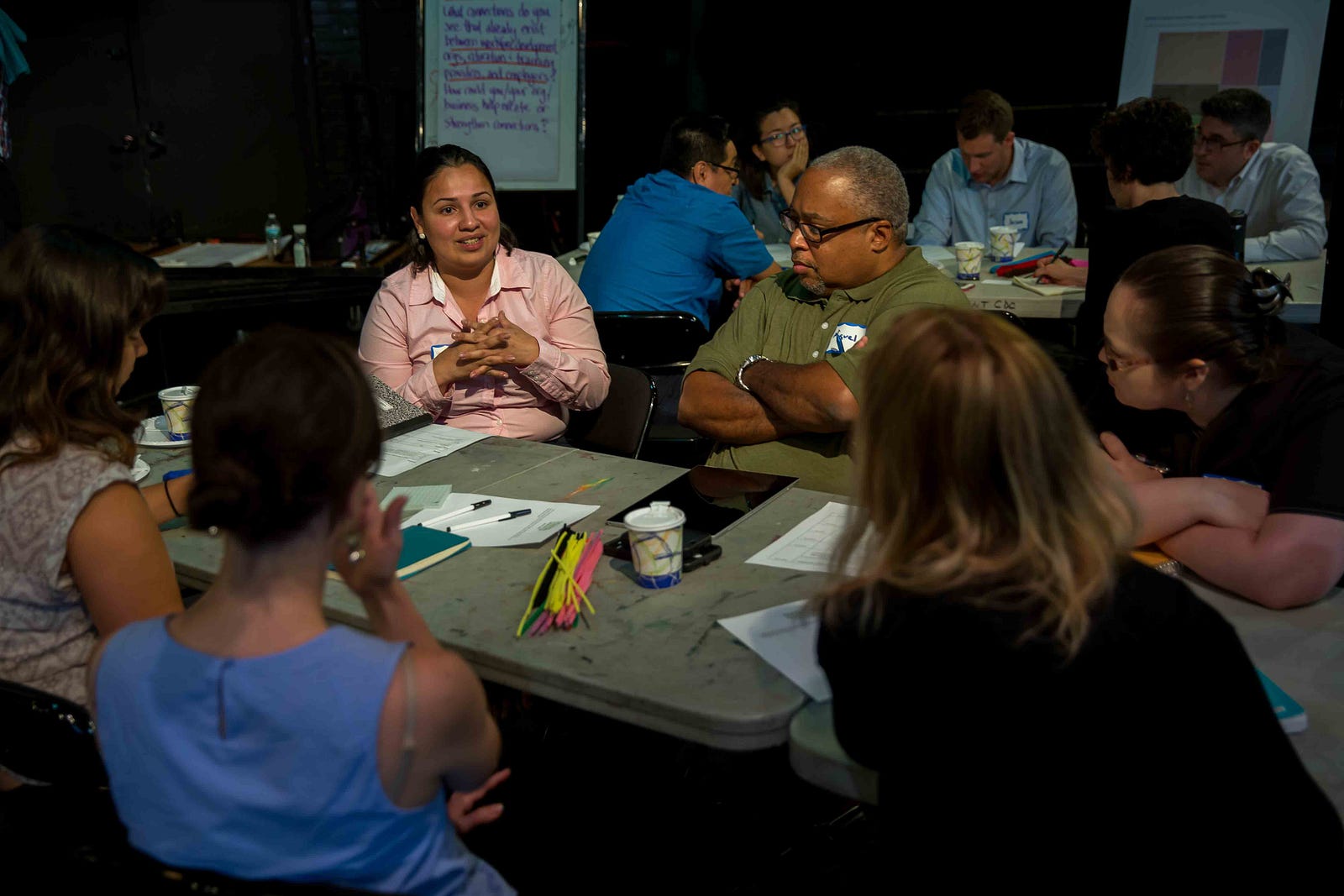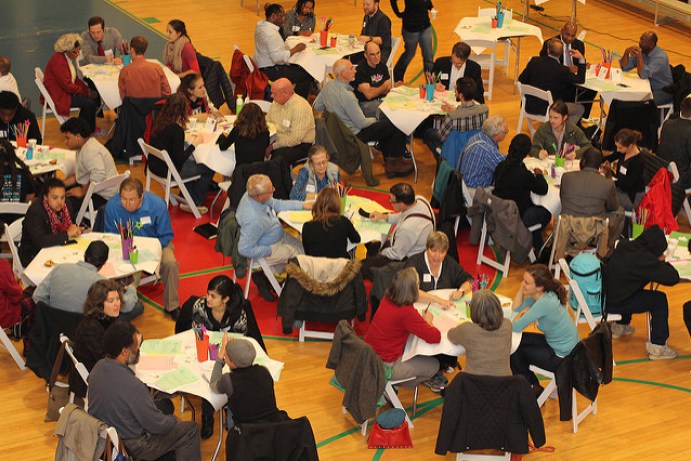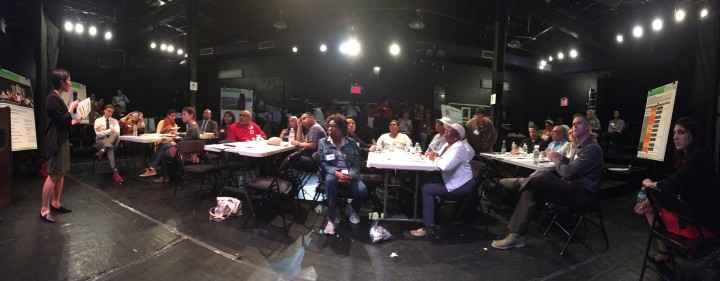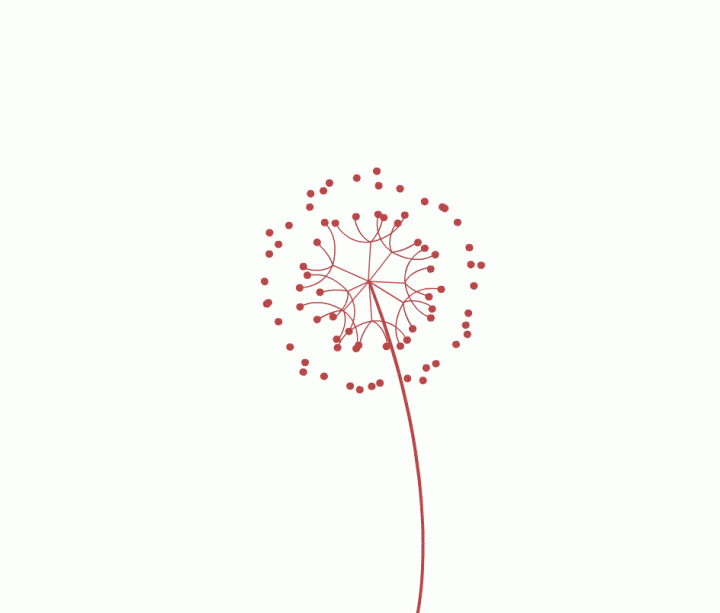A Look Back at This Summer’s Hunts Point Resiliency Collaboration Lab

Collaboration Lab participants discuss social and economic resiliency at The Point CDC.

Collaboration Lab participants discuss social and economic resiliency at The Point CDC.

This is a follow-up post to one from a few months ago focused on public engagement structures as important contributing factors to community resilience. The previous post ended by noting another important part of the engagement for resilience story is process.
For work we at IISC have done in a variety of communities, we have strived to ensure that public engagement processes are accessible, equitable, contribute to self-empowerment and community resilience, and get to other meaningful and desired outcomes. To this end, we have brought a number of process design considerations (see list below), all viewed through our collaborative change lens, which lifts up power, networks and love as central features to building real capacity for change. Read More
1 CommentMany of us who identify politically as left of center, and who work in nonprofits or foundations, have been upset, shocked, angry, sad, disappointed and more about the election of Donald Trump last week.
In reaction to this loss, many are awakening to the white supremacist (alt-right) forces gaining strength in our county. Many people are experiencing a greater degree of fear for our nation and for their safety than ever before. In the last week, I have witnessed a few reactive behaviors that are not going to serve us through this time. If we don’t stop ourselves from practicing these behaviors, we are in danger of pursuing short-sighted strategies that end up preserving the status quo, rather than taking advantage of this moment to push us forward toward a greater force of woke people standing for justice.

A team of us at IISC are partnering with an engineering firm to work on a climate change resiliency planning initiative in a vulnerable neighborhood in New York City. Our role is to lead the creation and implementation of a “stakeholder engagement plan” for broad-based input into project deliverables, including a fully funded infrastructure project and a feasibility study.
In developing our proposal for this initiative, we were guided by the notion that resiliency can and should be a core feature of social structures and processes. That is, threats to resiliency are found not simply in conditions such as low lying coastal communities or lack of back-up energy generation, but also in social disconnection and impaired flows of key resources. We were already aware of some of the vulnerabilities of this particular community, as well as its strengths in that it is well-organized and has a considerable density of social services and community organizations. That said, even when there are such assets in a neighborhood, there are many examples of municipally-sponsored projects that by-pass or fail to fully honor existing assets and networks in a community, with results ranging from missed opportunities to actually leaching resources (including time and trust). Read More
1 CommentEverything around us is designed. This stage, this auditorium fills 4,000 people and its sole design purpose is to have you focus on me. That’s how it’s structured. But there are other consequences of this design. So, for example, if you happen to be about six feet tall you’re probably hoping I’ll start talking so you can get your knees out of the front of the chair in front of you, right? Or if you happen to be, you know 4’5” or under you can’t wait to put your feet back on the ground. Those are the flaws in these designs because what we tend to do in this world is design for the middle and forget about the margins. What these new movements are saying to us is that it’s actually in the margins that we have to concentrate our design. And this feels a little counterintuitive, right, is that if you actually pay attention to the margin and design for them you actually cover the middle. It’s like a tent, right? If you take a tent and you stake it far out at the margins, well guess what, the middle is always covered. And the further out you stake it the stronger the structure you get. And why is that? Because in our systems and our social systems the people at the margins are actually living with the failures of the systems. And they are creating adaptive solutions to them. So when we design to take care of them we build stronger systems for everyone.

Here is Part 3 of The Ikeda Center Podcast’s interview series with Ceasar McDowell.
In this final segment of our three part interview, Dr. Ceasar McDowell introduces some early experiences that have inspired his work in community development. He also discusses the evolution of how we organize ourselves as human beings in community. He comments that while in the past we were born into specific communities or chose communities that were local and familiar, now “all of that has changed.” He adds that “we often find ourselves in places where we can’t then build an integrated community, so we look at how do we then take care of that other part of ourselves, which we can say is spiritual, relational, whatever it may be…For some people, they start to do it around work, or they do it around their habits, or they do it around church…All of that still keeps us separate, because now you’re holding this multiplicity of the places where you’re finding your identity and yourself and your connection, and it ends up being fragmented in some ways.” Dr. McDowell continues by exploring this new space that we find ourselves in, one of transition and change.
Leave a commentThis article was published in the winter 2015 edition of effect – Effective Philanthropy by the European Foundation Centre.
As we consider the changing socio-economic context in Europe and further afield, as the complexity of multi-faceted issues becomes ever more apparent and foundations try to figure out what to do to make change happen, one thing is certain. Conversations need to be started, understanding needs to be reached, agreements need to be built. This is where facilitation comes in. Facilitation creates the kind of safe spaces for people to discuss the most difficult and controversial issues. Our local work in Northern Ireland is a reminder of the need to engage in building peace and nurturing shared societies at local levels, group by group, community by community. At the core of this work is creating the conditions whereby people can begin to hear each other and be, to quote J P Lederach, ‘paradoxically curious’. Curious about each other, about how we see the world and about what drives us to hold – and defend – the positions we adopt.
1 CommentHere is Part 2 of The Ikeda Center Podcast’s interview series with Ceasar McDowell.
In the second of this three part interview, Dr. Ceasar McDowell details his vision for democracy as an ongoing process of interaction and engagement. He shares that the work of democracy is “how people come to know and understand both each other, the issues that are important to them, and how they want to make meaning together.” He adds that his current work is focused on the idea of Big democracy which he describes as, “an aspiration. And at the core of this aspiration is the belief that the public is fully capable of working together to create sustainable, just, and equitable communities. But to do so the public must have ongoing, peaceful ways to interact around traditions that bind them, and interests that separate them, so they can realize a future that is an equitable improvement on the past.”
Leave a commentSince the origins of this country we have been embedded in a belief about the hierarchy of human value, a belief that some lives are more important than others. Two examples of this clearly expressed are racism and sexism. As long as this belief system persists, it will undermine democracy. One way it shows up is as microaggressions, those little bitty acts that say to someone, “you don’t belong, you can’t be trusted, you’re less-than”. It’s a message a black man gets crossing the street in front of a car when people lock their doors. Or the catcalls a woman gets walking down the street. Brain scientists are teaching us that these types of aggressions are deeply wired in our brain and to change them we actually have to change the experiences that people have.
An antidote to microaggressions are micro-inclusions. These are little symbolic actions that force us to recall our humanity. They’re acts of humanity that signal to those at the margins they are included.
4 Comments“We can create a public that includes us all, and together bring in a new form of democracy.” -Ceasar McDowell #BigDemocracy
FOR IMMEDIATE RELEASE
IISC President Ceasar McDowell brought Big Democracy to TEDx Indiana University on November 13, 2015. The talk explores how disconnections in narrative, communications, and design stand in the way of democracy and what today’s global social movements are doing to repair these connections. McDowell articulates that we are in a new era called Big Democracy, one which can hold the diversity and complexity of people in the world.
McDowell calls on the audience of 4,000 to begin the change today by practicing a micro-inclusion, or small way to show someone “you’re included, I can see you’re there.”
The talk closed a powerful evening of speakers around the theme “Eyes on the Stars, Feet on the Ground.” Thanks to everyone at TEDx Indiana University for the invitation to speak and for an incredibly well-produced event.
1 CommentThe Ikeda Center Podcast is releasing an interview series with Ceasar McDowell.
In the first of this three part interview with Dr. Ceasar McDowell, he describes the central focus of his work in the development of community knowledge systems and civic engagement. He also shares some examples of how that focus has manifested. In his words, “I can boil it down to one thing. My work, my research interests, my life, is about voice. And particularly how people—and specifically the people who are at the margins of society–are able to both name their experience in the world, have that naming be recognized, and also open themselves up to the experience of others.”
Leave a commentOur eyes met and locked a split second after we noticed the feet of two young men sitting next to each other in the circle – both had a pant leg rolled up to show an ankle monitor. In the same circle, sat two sheriffs with guns and tasers strapped to their hips and covered by their untucked shirts. It was day three of our training, Moving Forward in Addressing Race, Power and Privilege, and we were now harvesting the fruits of many hours of challenging mental, emotional and spiritual work.
“I have learned to see that not all police officers are rude and mean,” shared a 14 year-old Latina girl. “I have learned that some officers care about me and want to be fair; this is the first time I’ve been in a space where I felt heard by adults (in the system).”
Having law enforcement at the table with an openness to change is important. Systems are made up of individuals. Individuals centered on equity values and skilled in moving policy forward, in partnership with multi-sector networks towards common goals, can create long term change.
“I have gained sight and vision where before I was blind,” shared a white male law enforcement officer, “and I am willing to give what ever it takes personally and professionally to our cause.” Read More
1 Comment